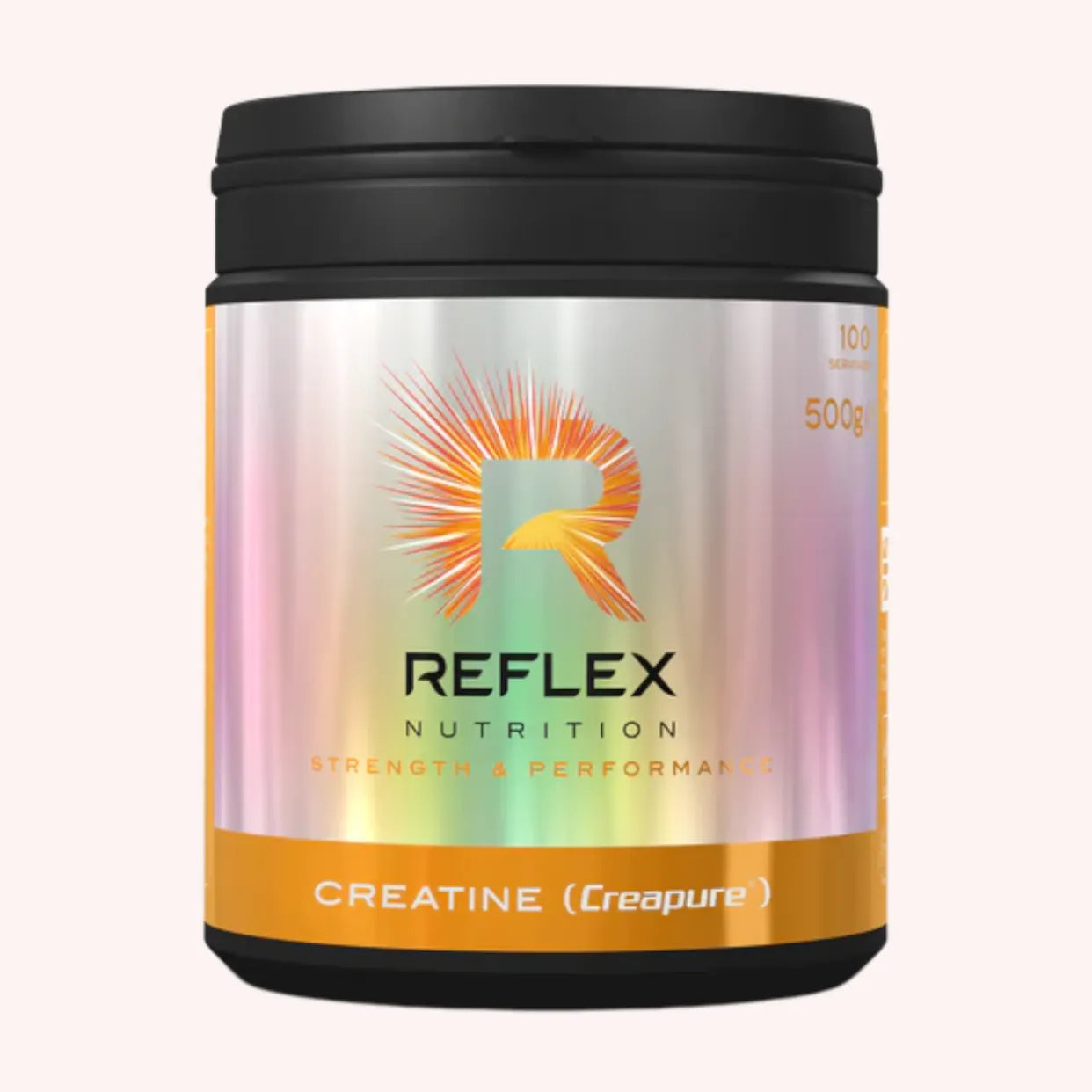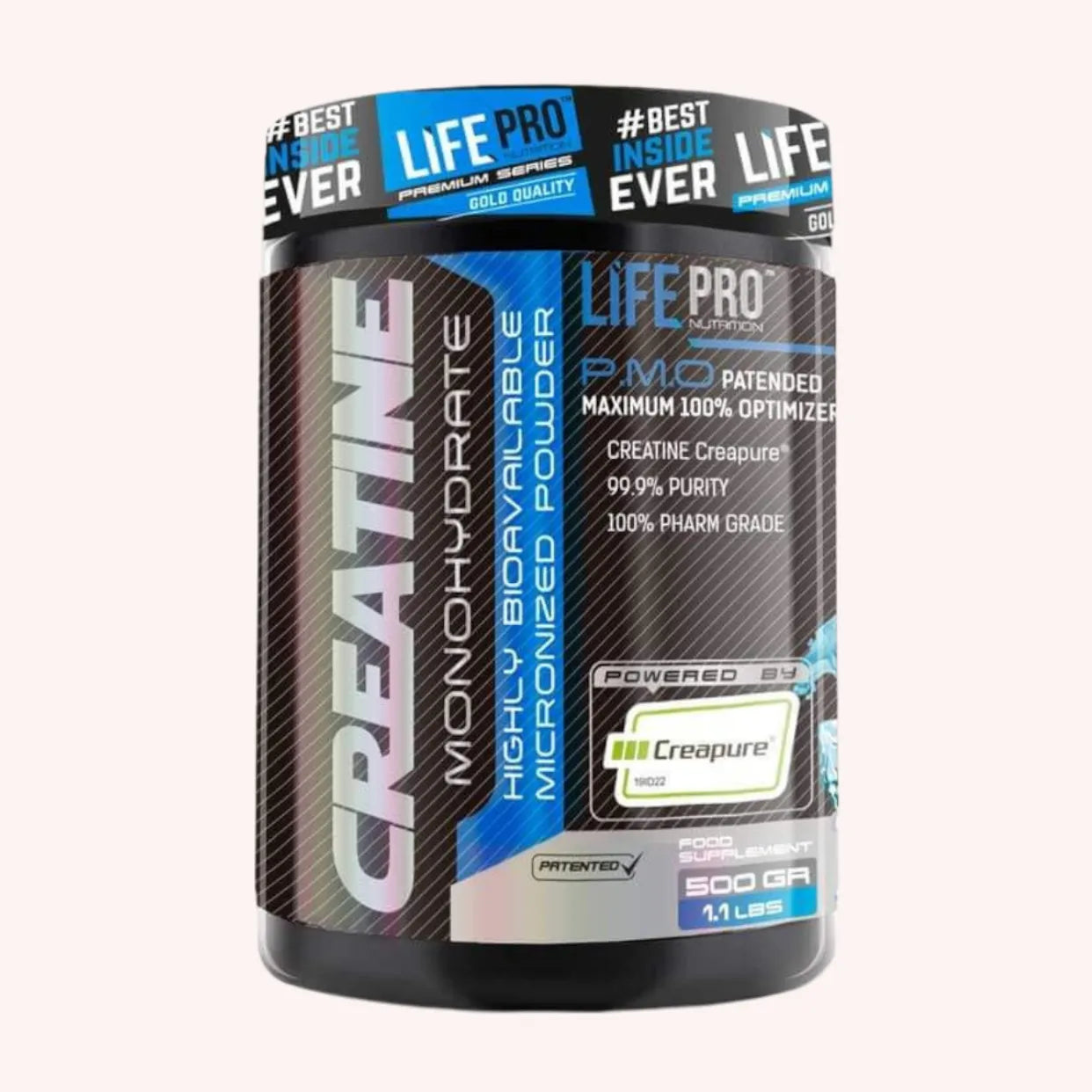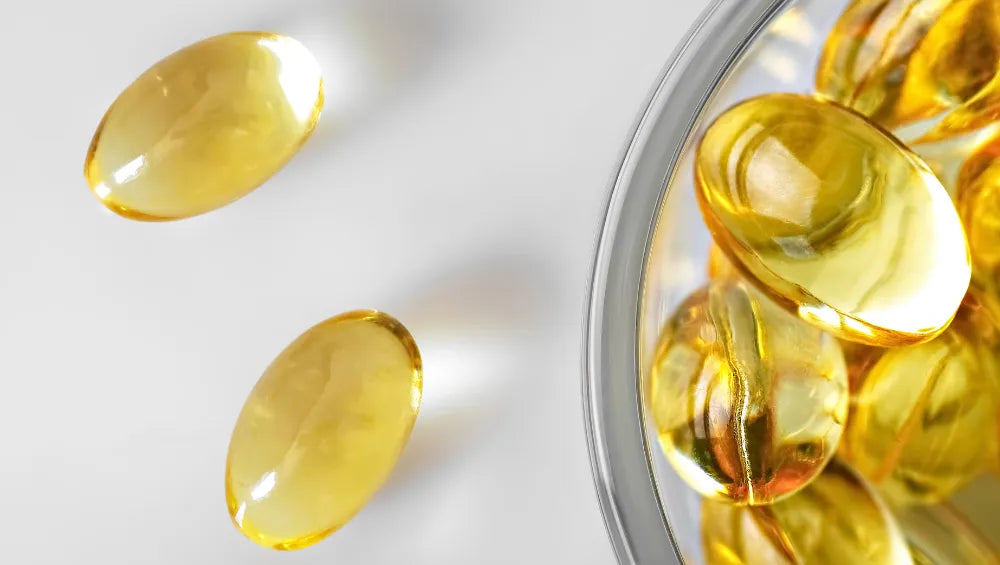Creatine is one of the most popular and researched sports supplements in the world. Used primarily by athletes and bodybuilders, it is renowned for its ability to enhance physical performance and promote muscle mass gain . Here, we will examine the various effects of creatine based on scientific studies and athlete testimonials. We will explore what creatine is, how it works, its food sources, the benefits of supplementation, and best practices for its use.
What is creatine?
Creatine is an organic compound derived from amino acids, specifically arginine, glycine, and methionine. It occurs naturally in the human body, where it plays a central role in muscle energy metabolism.
The majority of creatine in the body, about 95% , is stored in skeletal muscle as phosphocreatine.
Synthesis and function of creatine
Creatine synthesis begins in the kidneys with arginine and glycine, which react to form guanidinoacetate . This compound is then transported to the liver, where it is methylated to produce creatine. Creatine is then released into the blood and transported to the muscles, where it is phosphorylated to form phosphocreatine. Phosphocreatine is a rapid energy store. During short , intense physical exertion, such as sprinting or weightlifting, the muscles' stores of ATP ( adenosine triphosphate ) are quickly depleted. ATP is the primary energy molecule in cells, but it cannot be stored in large quantities. Phosphocreatine then steps in to replenish ATP by providing a phosphate group, allowing the muscles to continue producing energy quickly and efficiently.
Creatine metabolism
Creatine metabolism in the body is a continuous process. Approximately 1 to 2% of total body creatine is broken down each day into creatinine, a metabolic waste product that is excreted by the kidneys in the urine. This means that the body needs to constantly replenish its creatine stores, either through endogenous synthesis or dietary intake.
Food sources of creatine
In addition to endogenous synthesis, creatine is also obtained from food. The main dietary sources of creatine are animal products, such as red meat and fish. For example, herring, beef, and salmon are rich in creatine, making them valuable foods for people who do not take creatine supplements.
Creatine transport and absorption
Creatine transport into muscle cells is mediated by a specific transporter, the creatine transporter (CRT). This transporter is regulated by various factors, including creatine availability in the blood and cellular energy levels.
When creatine stores are low, creatine transporter activity increases to maximize creatine uptake and storage in muscles.
Ergogenic Benefits of Creatine
Creatine's ability to increase phosphocreatine stores in muscles makes it a powerful ergogenic sports supplement for athletes and bodybuilders.
By increasing phosphocreatine levels, creatine allows for faster and more sustained ATP production, which improves performance during intense, short-term efforts. This results in increased strength, power, and muscular endurance, as well as faster recovery between exercise sets.
Creatine Beyond Muscle
Although most creatine is stored in skeletal muscle, it is also present in other tissues, including the brain and heart. In the brain, creatine affects neuronal energy metabolism, which may have implications for cognitive function. In the heart, creatine contributes to cardiac muscle efficiency, although its exact effects are still being investigated.
Food sources of creatine
Creatine is found naturally in several foods, primarily in animal products such as meat and fish. For example, one kilogram of red meat contains about 5 grams of creatine . Food sources of creatine include:
- Beef: 4.5 g/kg
- Pork: 5 g/kg
- Herring: 6.5 g/kg
- Salmon: 4.5 g/kg
- Tuna: 4 g/kg
- Cod: 3 g/kg
Plant sources contain very little creatine, which is why vegetarians and vegans can benefit greatly from creatine supplementation to achieve optimal levels.
Why take creatine powder?
Although creatine is present in the diet, it is difficult to consume enough of it through food alone to maximize its ergogenic effects. For example, to obtain a 5-gram dose of creatine , one would need to consume about a kilogram of red meat , which is neither practical, economical, nor environmentally friendly.
Sports supplements are therefore a flexible and effective solution for increasing creatine levels in the body.
The benefits of creatine for athletes
Improved physical performance
One of the main effects of creatine is the improvement of physical performance , particularly in sports requiring intense and short-term efforts.
Studies show that creatine supplementation can increase maximum power and strength by 5-15%. This allows athletes to train harder, perform more repetitions, and recover faster.
Increased muscle mass
Creatine also contributes to increased muscle mass . Studies report gains of 0.5 to 1.6 kilograms in the first two weeks of a creatine regimen . These gains are mainly due to water retention in the muscles. In the long term, creatine promotes muscle growth by increasing the muscles' ability to perform more intense exercises.
Effects on strength and endurance
Creatine improves muscle strength and endurance by increasing available ATP levels in the muscles. This helps delay muscle fatigue and extend exercise duration. This allows athletes to achieve superior performance in training and competition.
By increasing available ATP levels in muscles, creatine delays muscle fatigue and prolongs exercise duration. Studies show that creatine supplementation can increase maximum power and muscle strength by 5 to 15%, particularly beneficial for sports requiring explosive efforts such as weightlifting, sprinting, and combat sports. By increasing ATP regeneration, creatine helps maintain high performance during intense exercise and promotes faster recovery between sets, allowing for more frequent and intense workouts.
Creatine also improves anaerobic endurance, allowing for repeated intense workouts with less recovery time, which is essential in sports like football and basketball. By facilitating muscle recovery, it reduces post-exercise soreness and inflammation, allowing for a faster return to training.
When to take creatine?
The ideal time to take creatine is a matter of debate among experts. However, studies suggest that taking creatine immediately after training may provide better results in terms of lean mass gain.
Creatine can therefore be mixed with a post-workout snack, often consisting of protein and carbohydrates, to improve its absorption.
Recommended daily dose
For a long time, a loading phase of 20 grams of creatine per day for five days was recommended, followed by a maintenance phase of 5 grams per day .
However, studies show that taking 3 to 5 grams per day without a loading phase can be just as effective in the long term. A lower dose also reduces the risk of digestive upset and organ overload.
Creatine: Before or after training?
It is generally recommended to take creatine after training to maximize muscle gains. However, some athletes prefer to split their daily dose into several doses spread throughout the day. This method can improve the absorption and utilization of creatine by the muscles.
When considering when to take creatine, it's important to consider that taking small doses throughout the day can maintain more stable creatine levels and promote better muscle saturation.
Why take creatine breaks?
Whether to cycle creatine intake or take it continuously is also a debated topic. Some athletes opt for two-month cycles followed by a one-month break to prevent gains from stagnating. Others prefer continuous intake, adjusting their intake based on their training intensity.
Taking a break helps restart the body's natural synthesis of creatine and prevent possible tolerance.
Combining creatine with other supplements
Creatine and whey protein
The combination of creatine and whey protein is particularly recommended for bodybuilding enthusiasts. Creatine allows for more intense workouts, while whey protein provides the amino acids needed for muscle recovery and growth.
Taking these two supplements together post-workout maximizes their synergistic effects.
Creatine and BCAA
BCAAs ( Branched Chain Amino Acids ) are often used around workouts to improve recovery and reduce muscle breakdown. They can be combined with creatine to optimize performance and muscle growth.
However, priority should be given to a balanced diet and sufficient protein intake.
Creatine and glutamine
Glutamine is another popular supplement among athletes. It is known for its effects on protein synthesis and recovery. While creatine and glutamine can be taken together, it's important to note that their mechanisms of action are different.
Creatine is primarily used to improve performance and strength , while glutamine supports recovery and gut health .
Side effects of creatine
Creatine is generally well tolerated by most users when taken in recommended doses. Potential side effects include cramps , headaches , and digestive upset , especially when consumed in large amounts.
It is essential to drink enough water to avoid dehydration, especially during intense exercise or in hot weather.
Creatine and kidney function
Some concerns have been raised about the impact of creatine on kidney function . However, most studies have not found strong evidence that creatine damages the kidneys in healthy individuals.
However, it is recommended that people with a history of kidney problems consult a healthcare professional before starting creatine supplementation .
Other potential side effects
Other potential side effects of creatine include weight gain due to water retention and muscle soreness.
These effects are usually temporary and lessen over time. It is important to follow dosage recommendations to minimize these risks.
Creatine and cognitive performance
Although creatine is primarily known for its effects on physical performance, recent research suggests that it may also have beneficial effects on cognitive function.
Studies have shown that creatine may improve memory, concentration, and intellectual abilities by increasing the availability of ATP in the brain. These effects are particularly interesting for students and professionals looking to improve their mental performance.
Creatine in endurance sports
Although creatine is often associated with strength and power sports, it can also be beneficial for athletes involved in endurance sports. Creatine can help improve performance by increasing phosphocreatine stores in the muscles, allowing for faster recovery between intense efforts.
Athletes who practice endurance sports can thus benefit from better resistance to fatigue and faster recovery.
Creatine and Body Composition
One of the remarkable effects of creatine is its impact on body composition. By increasing muscle mass and reducing body fat, creatine can help athletes improve their physique and performance. Studies have shown that creatine supplementation can lead to a significant increase in lean muscle mass and a reduction in body fat, especially when combined with a proper training program.
Creatine and Bone Health
Recent research suggests that creatine may also have beneficial effects on bone health. Creatine supplementation has been shown to increase bone mineral density and improve bone strength.
These effects are of particular interest to athletes and the elderly seeking to prevent fractures and bone injuries.
Creatine and neuromuscular adaptations
Creatine can also influence neuromuscular adaptations to training. By increasing ATP availability in muscles, creatine allows for faster and more efficient muscle activation.
This can lead to improved athletic performance and a reduced risk of injury.
Creatine is therefore a supplement widely recognized for its numerous beneficial effects on physical performance and muscle growth. By increasing ATP levels in the muscles, it allows for more intense workouts, better recovery, and significant muscle gains.
Although creatine is present in certain foods, supplementation remains the most effective way to achieve optimal levels. To maximize the benefits of creatine, it is essential to follow the recommended doses and combine it with a balanced diet and an appropriate training program.
Sources :
- How is the quality and purity of Creapure® guaranteed? : https://www.creapure.com/en/creapure/how-quality-and-purity-creapure-guaranteed
- Creatine as nutritional supplementation and medicinal product. (PMID: 11317142): https://pubmed.ncbi.nlm.nih.gov/11317142/
- Timing, optimal dose and intake duration of dietary supplements with evidence-based use in sports nutrition. (PMC5545206): https://pubmed.ncbi.nlm.nih.gov/28150472/
- Effects of creatine supplementation on performance and training adaptations. Kreider RB. (PMID: 12701815): https://pubmed.ncbi.nlm.nih.gov/12701815/
- Creatine supplementation and exercise performance: recent findings. Bemben MG, Lamont HS. (PMID: 15707376): https://pubmed.ncbi.nlm.nih.gov/15707376/
- Effects of creatine supplementation on renal function. (PMID: 15273072): https://pubmed.ncbi.nlm.nih.gov/15273072/
- The effect of creatine intake on renal function. (PMID: 15886291): https://pubmed.ncbi.nlm.nih.gov/15886291/
- Creatine supplementation does not affect clinical health markers in football players. Cancela P, Ohanian C, Cuitiño E, Hackney AC. (PMID: 18780799): https://pubmed.ncbi.nlm.nih.gov/18780799/
- Is the use of oral creatine supplementation safe? (PMID: 15758854): https://pubmed.ncbi.nlm.nih.gov/15758854/








